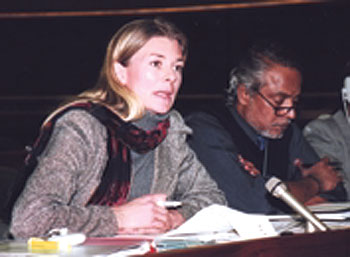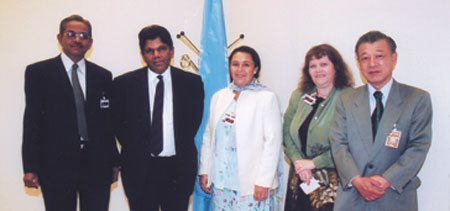| REPORT FROM GENEVA |
| Making the Case for Human Rights |
| Yohei Sasakawa puts leprosy on the agenda at the U.N. Commission on Human Rights. |
| The Commission on Human Rights meets every spring in Geneva. |
| |
| |
At the end of March, WHO Goodwill Ambassador and Nippon Foundation President Yohei Sasakawa led a delegation to Geneva to take part in the 60th session of the United Nations Commission on Human Rights held from March 15 to April 23, 2004. The issue he brought before the commission was the discrimination in societies around the world toward those affected by leprosy and the need for guidelines to recognize and protect their human rights.
Comprising a rotating membership of 53 states, the commission meets each spring for six weeks at the U.N.'s Geneva headquarters. Over 3,000 delegates from member and observer states and NGOs attend the annual session, during which the commission adopts about 100 resolutions and decisions pertaining to human rights.
The UNCHR is assisted in its work by the Sub-Commission on the Promotion and Protection of Human Rights, a number of working groups, and a network of individual experts, representatives and rapporteurs mandated to report to it on specific issues.
Sasakawa's bid to get leprosy taken up as a human rights issue at the commission started last July, when he met Acting High Commissioner Bertrand Ramcharan in Geneva. At Ramcharan's suggestion, he organized a panel briefing for members of the sub-commission on August 5, 2003, on the social and human aspects of leprosy.
With the cooperation of Professor Paul Hunt, special rapporteur for the right to health, Sasakawa returned to Geneva this spring to present an exhibition on people affected by leprosy, host a panel discussion with participants from Japan, Brazil, India and the United States, and present an oral statement to the commission.
Behind the initiative is the fact that while progress is being made toward eliminating leprosy as a public health problem by the end of 2005, social discrimination remains a deepseated problem.
|
| |
Millions live in isolation. They have no homes to return to.
They are dead to their families. |
| |
Although national isolation policies have been largely abandoned and laws changed, and although leprosy is now curable, in some cases the social reaction to the disease remains so severe that even those who have been completely cured are unable to take their place in society.
Given only three minutes to make his presentation, Yohei Sasakawa ran through the list of problems faced by those affected by the disease.
“Mr. Chairman, discrimination is still rampant.
Those cured of leprosy still can't marry. They can't get work. They can't go to school. They are still treated as outcasts. ... Many still think leprosy is dangerous or hereditary. Many still see it as a divine punishment. And so millions live in isolation. They have no homes to return to. They are dead to their families.”
Afterward, many people came forward to request copies of the oral statement. It was encouraging to see the level of interest, given the fact that this was just one of dozens of presentations made by NGOs on the day.
Elsewhere, there was interest, too, in the photo exhibit sponsored by The Nippon Foundation showing the plight of those facing leprosy-related discrimination.
During his stay in Geneva, Sasakawa had meetings with Acting High Commissioner Ramcharan, Special Rapporteur Hunt, and with officials of IDEA, an international network of leprosy-rights groups that is striving to bring dignity to the lives of those affected by this discrimination.
He also met with Helena Nygren-Krug, WHO health and human rights advisor, who took part in the panel discussion and stated WHO's eagerness to tackle leprosy from a human rights perspective.
Ambassador Sasakawa plans to continue participating in commission meetings in the future, working to see that the commission adopts a resolution that calls on governments to tackle the issue of discrimination. In particular, he wants to see the commission create guidelines for governments, NGOs and other stakeholders that will give impetus to efforts to end discrimination.
In that regard, the visit to Geneva this spring was extremely valuable and will hopefully serve as an important stepping stone on the way to seeing discrimination of the affected individuals and their families officially recognized as a human rights issue. |
| |
| |
| |
| |
| TAKING AIM AT DISCRIMINATION |
| Panelists share their thoughts on the urgent need to tackle stigma. |
| |
 |
| |
A panel discussion organized by the Nippon Foundation on the sidelines of the 60th session of the Commission on Human Rights provided moving testimony as to why the social aspects of leprosy must be addressed.
Chaired by Professor Kenzo Kiikuni, Sasakawa Memorial Health Foundation, the seven-member panel included two persons affected by leprosy.
Dr. P.K.Gopal, president, IDEA, noted how fear and unscientific beliefs among lay people about the nature of the disease resulted in the stigmatization of those with leprosy that persists today. The presence of a leprosyaffected person affects the whole family, he said, making it hard for a son or daughter to get married, and for the family to find accommodation. He also pointed out that discriminatory legislation remains on the statute books in India, and that some hotels and temples still display signs refusing entry to those with the disease.
Zilda Maria Borges, IDEA-MORHAN Brazil, said that the end of leprosy will not come with the elimination of the disease, but when those who have been affected by it are recognized as having the same human rights as everyone else in society. She cited a couple of encounters with women cured of leprosy, one of whom felt ‘dead inside', and the other who contemplated killing herself because she despaired of her future. When such suffering exists, said Borges, we must not delay in working to achieve human rights for all.
Anwei Law, international coordinator, IDEA, described society's response to those with leprosy as “the most persistent and pervasive form of social injustice that society has forced on its fellow human beings.” People were segregated because they were deemed to be undesirable, expendable and inferior, she said, and even today, the historical tradition of discrimination and seclusion continues.
“There are young people living in leprosy hospitals even though they are completely cured,” she said. “We should be ashamed.”
Professor Paul Hunt, UNCHR special rapporteur on the right to health, noted that the right to health was a fundamental human right found in the 1948 Universal Declaration of Human Rights. Discrimination on grounds of health status, former health status or a family member's health status is unlawful, he said. The state is obliged to take measures to ensure its officials do not discriminate against those affected by leprosy, to make reasonable efforts to ensure that third parties don't, and to educate the public.
Yohei Sasakawa, The Nippon Foundation, spoke of his “frustration, horror and disappointment” as he discovered that many of those cured of the disease were unable to take their place in society because of the discrimination they faced. Political leaders and the media need to be made more aware of the problem, he said, and efforts must be made to improve education.
Helena Nygren-Krug, WHO health and human rights advisor, commented that WHO is turning its attention to the social as well as the medical aspects of leprosy, now that WHO Director-General Jong-wook Lee has made human rights a priority area. “Stigma and discrimination can be one of the most serious impediments in successfully tackling a disease,” she said. |
| |
 |
| |
| Yohei Sasakawa (far right) with (from left) P.K.Gopal, Acting High Commissioner for Human Rights Bertrand Ramcharan, Zilda Maria Borges and Anwei Law. |
| |
| |
| From the floor, a member of a Nigerian human rights NGO suggested that the cause of people affected by leprosy would be helped by collaborating with mainstream human rights organizations, and she offered to raise awareness of the issue in her own country. It was a positive note on which to end the discussion, and showed what stands to be achieved if more people are made aware of the issue and decide to act. |
| |
|